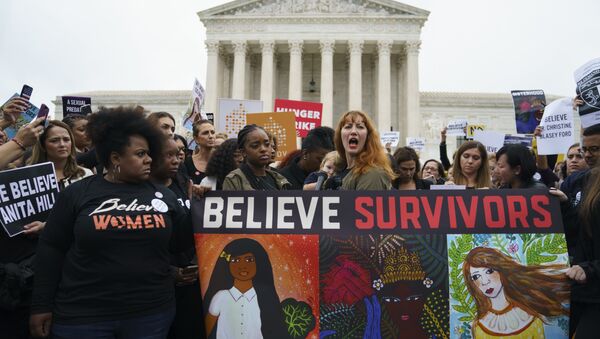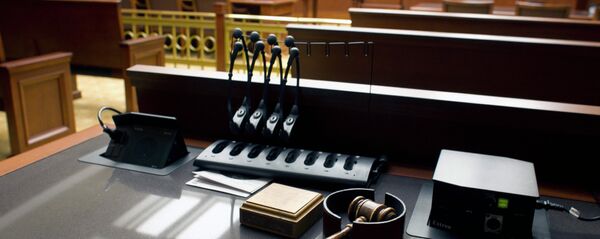The day of Ford's testimony, which was run on live television nationwide, staff at the National Sexual Assault Hotline, a phone number to a confidential service providing support for victims of sexual assault, experienced a dramatic spike in call traffic, CNN reported. Sara McGovern, spokesperson for the Rape, Abuse & Incest National Network, which manages the hotline, told CNN they saw a 201 percent increase in calls compared to a typical day.
Since the #MeToo movement began almost a year ago, casting both violence against women and its incredible prevalence into the international spotlight, and encouraging victims to come forward and name their attackers, "the demand for RAINN's services has been off the charts," McGovern told the news outlet.
"Our victim service programs went from helping about 15,000 victims per month to helping about 22,000 per month," she said.
Radio Sputnik's Loud & Clear spoke with Danielle Norwood, a reproductive rights activist and a therapist specializing in treating adult and adolescent survivors of trauma, about her experiences with sexual assault reporting and her thoughts about the effect of Ford's testimony.
"There's two sides to it. It's quite painful, I think, for a lot of survivors to sort of relive that experience of being questioned and even this sort of aggressive, belligerent response to ever questioning a man's character," Norwood told host Brian Becker. "I saw a lot of people who were really struggling with just following the news, reliving their own experiences. But then there's also a really positive side where I think women are seeing — and all survivors are seeing — this tendency toward believing these stories or at least hearing them out."
However, Norwood told Sputnik that "in the hearings themselves, in the government — certainly in the judicial system — we haven't yet seen the kind of shift that we want to see towards more accountability for perpetrators. I think in the court of public opinion we are certainly seeing a tide change toward believing survivors, believing women, creating an atmosphere where people will come forward, so that's the positive of it."
"In my own timelines on social media, I saw several people come forward who I'm close with, who shared stories they'd never shared before, so I think there's something very empowering about telling these stories that I think are almost universal, that we have all sat on for our entire lives. To be told it's OK to come forward with those, to be validated, to be told that your experiences are worth sharing and will be believed, that's very powerful," Norwood said.
"I think there is a lot of potential in this movement, because it is, unfortunately, what seems like a nearly universal experience. Not only sexual assault and harassment, sexual violence, but also this idea that we're not entitled to share those stories, that a man's reputation or his future or his potential is, by default, more valuable than a woman's experience."
"I say women because we're pretty focused on heterosexual straight women in this discussion, but this is true of all survivors: it's a tremendous risk to come forward with your story. There's almost no benefit other than whatever personal gratification you get from being authentic and sharing your truth. Most survivors who come forward face terrible repercussions, at best reliving it in a hostile environment with police and with the courts, so it's not something that anyone takes lightly. But I think seeing other people do it, seeing other people go through it, and the support that they receive and the sort of reassurance that it's not OK that these things happen, that is what's empowering people to come forward and tell the truth," Norwood said.
"I don't know how much of it is a personal sense of shame or responsibility, but we're starting to see stories that almost no one came forward with in the past, where women are honest about the things that they did, like drinking or being in a situation that, even 10 years ago, would've been used to justify whatever happened. Women are coming forward and being honest and saying, ‘Yeah, I was drinking, and this person assaulted me, and it's still not OK.' So it's really gratifying."
"I'm 37, and in my lifetime I've seen this drastic shift from this culture in the ‘80s, where sexual violence was sort of par for the course — it was to be expected, it was part of life — to now where we're actually taking a pause to say, ‘Wait, it's not okay that this one group of people, primarily white straight men, treat rape as an entitlement.'"
"They believe, clearly, that they have the right to other people's bodies — and not only that, but to never be confronted about it, to never have any responsibility for it, and I think the message that that sends is that some people's experiences, some people's lives, are more valuable than others. So it's very empowering, very gratifying to see a push back against that idea."





